Higher Education Quality Assurance in Moldova


Elena Petrov, PhD, Associate Professor, Vice-President of ANACIP
Source: Ministry of Education,Culture and Research, Moldova
For the past 26 years after the Declaration of Independence was endorsed on 27th August, 1991, the system of higher education in Moldova has significantly transformed. The reforms were implemented in incremental phases in compliance with the priorities essential for every phase. A new law on education came into force in 1995, which represented the legal basis for the reforms.
A new impetus for the reforms was given in 2003, after the Ministry of Education, Culture and Research declared joining the Bologna process. This was followed by two-year intensive actions and transformations in the system of higher education on the national level, mainly aimed at elaboration of the legal framework, introduction of structural reforms, communicating with teachers, students and the community.
In this respect, the main objective of reforms was to make national higher education competitive and attractive by harmonizing it with the European systems of higher education within the European Higher Education Area (EHEA), and the growing academic mobility. In 2005 the ministers responsible for higher education met in Bergen. That’s when and where Moldova endorsed the Bologna Declaration, thus, becoming a full member and an active partner of the Bologna Process.1
In the next decade special actions were taken for gradual alignment of the Moldovan standards in the sphere of higher education with those of EU member-countries in order to bring the former in compliance with the objectives of the Bologna process.
Key milestones of the reforms 2005-2017
• The newly implemented structure of higher education is based on three cycles:
- The process was initiated in 2005 when the first students were enrolled in Licentiate (Cycle I).
- In 2008 the implementation of the Master’s program started (Cycle II).
- Beginning from 2015 PhD programs have been implemented (Cycle III).
• Moldova HEIs train specialists in about 200 majors in Cycle I. About 350 programs for Cycle II were authorised for implementation by the Ministry of Education, Culture and Research. The programs for Cycle III were comprised within 45 PhD schools.
• Beginning from 2006 the European Credit Transfer and Accumulation System (ECTS) has been implemented with the functions of both accumulation and transfer. An ECTS implementation guide has been drawn up to assist HEIs.
• In order to ensure qualification and degree transparency all university graduates get European Diploma Supplement in English and in the national language. The document is granted free of charge. The Supplement is maximally personalized in order to give a better idea of its holder to the prospective employer. The Supplement also contains information on the national system of higher education.
• The relevant Ministry in cooperation with other stakeholders are elaborating the National Qualifications Framework (NQF) for different levels of professional education. The National Qualifications Framework for higher education2 is compatible with the European Qualifications Framework for Lifelong Learning (EQF) and describes the national levels of higher education and their interconnection with the levels of the International Standard Classification of Education (ISCED). Since 2006 there have been developed a few versions of NQF in every major included in the list of professional training programs and majors for student training at higher education institutions, Cycle I.3
• Particular attention on the national level is given to the social orientation of higher education including (1) making higher education more accessible, (2) financial and material student support, (3) ongoing consultancy rendered to students during training, assessment, etc.
• The state-financed grants are distributed among the best students based on the results of annual competition. Students educated on a contractual basis are also apt to compete for the state-funded grants. Students may get state-funded scholarships including personal scholarships (Scholarship of the Republic, Scholarship of the President, Scholarship of the Government).
Throughout this period there have been continuous improvements, amendments, specification of the legal framework regulating the sector of higher education. Numerous provisions and guidance notes including laws and government decrees regulating different aspects of HEIs’ operation have been designed, approved and endorsed. The Education Development Strategy “Education 2020” for the period 2014-2020 was also designed and approved (2012). In the context of adapting
the legislation applicable to higher education to European norms a new Code of Education was enacted (2014), which includes a number of statutory provisions aimed at modernisation of higher education in the Republic of Moldova based on the principles of quality openness and transparency.
It is important to note that ongoing dialogue and social partnership follow all the reforms in the sphere of higher education. In order to provide this the Ministry of Education, Culture and Research involves all the stakeholders in the processes of design and enacting of all the reforms. The stakeholders include the Collegium of the Ministry, Rectors’ Council, representatives of students’ associations and trade unions, representatives of the business and economic community.
National higher education in figures4
Higher education institutions
- Thirty higher education institutions including 19 public and 11 private.
- Eleven state institutions subordinated to the Ministry of Education, Culture and Research and six specialized HEIs subordinated to other ministries.
- Twenty-six HEIs located in the Moldova capital, Chisinau, and four regional HEIs located in Balti, Comrat, Cahul and Taraclia.
Students
• The number of students as of October 1, 2016: 74,726.
• Student distribution in cycles:
- Cycle I of higher education—Licentiate—56,570 students;
- Cycle II—Master’s degree—13,639 students;
- integrated academic programs—763 students;
- Medicine and Pharmacy programs—3,754 students.
• About 83% of the total number of students are enrolled in state institutions.
• The number of international students is 3,700 including about 54.5% from Israel, 28.9% from Romania, 3.5% from Turkey, 3.2% from Ukraine, 2.8% from India. Over recent years the number of international students increased by 55%.
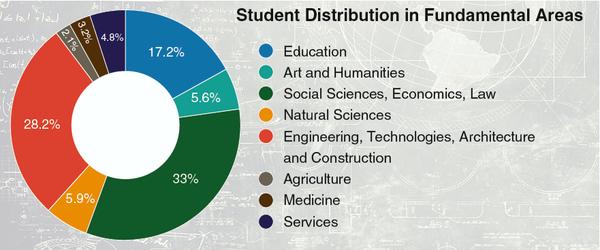
Teaching staff
- In the 2016/17 academic year the full-time university staff comprised 5,000 people including 2,600 holders of scientific degrees with 400 holders of the Doctor Habilitat degree among them.
- The proportion of women in the total teaching staff is 54,3%.
Cycle III—Doctoral degree5
- In 2016 training for the Doctor’s degree was carried out at 45 doctoral schools established at universities, consortiums, in the framework of national and international partnerships.
- The total number of doctoral students was 1,718 (excluding international doctoral students), which is 1.9% less from the year earlier period. Almost three thirds of the total doctoral students are enrolled in the extramural form of studies. In 2016 the number of doctoral students decreased in both the intramural (by 3.3%), and extramural (by 1.4%) forms of studies.
- The total number of international doctoral students amounted to 246, including 194 (78.9%) from Romania and 21 (8.5%) from Israel.
Quality assurance in higher education in the Republic of Moldova
A significant step towards the improvement of higher education is ensuring its quality, both internal and external.
In the context of university autonomy, in order to stimulate internal quality, the Ministry has designed and passed over to the universities a list of recommendations meant to assess students’ academic activity. On the university level this list has transformed into university regulations.6
In recent years higher education institutions continue developing and implementing the mechanisms of the internal quality control as well as their own systems of quality assurance.
Over the past 25 years the process of external quality assurance in the sphere of higher education has gone through a number of ambiguous phases and reforms including the following:
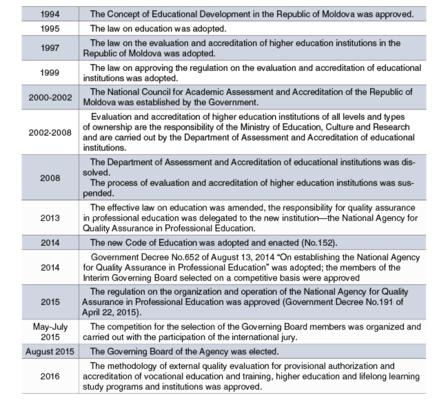
National strategy and policy for quality assurance
In accordance with the Code of Education, quality assurance in higher education should be carried out through a set of actions focused at building institutional capacity to develop, plan, and implement the study programs, which would set up and strengthen the confidence of the beneficiaries that the institution providing education meets and improves the quality standards in line with the assumed mission.7
The quality management in higher education is ensured at two levels: (1) at the national level—by the Ministry of Education, Culture and Research and the National Agency for Quality Assurance in Professional Education; (2) at the institutional level—by internal structures for quality assurance.
Traditionally a fully operational quality assurance system implies two successive stages:
• The first stage includes provisional authorization, which grants the right to establish the institution, to carry out the educational process and to organize the admission to education;
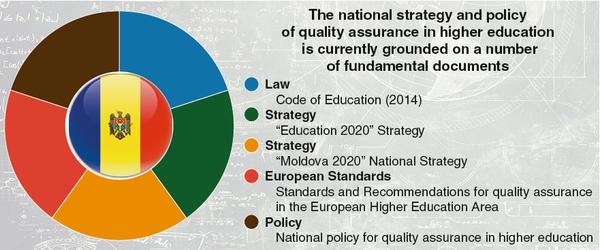
• The second stage includes accreditation, which grants the right to organize the graduation exam, as well as the right to issue diplomas, certificates, and other qualification documents recognized by the Ministry of Education, Culture and Research.
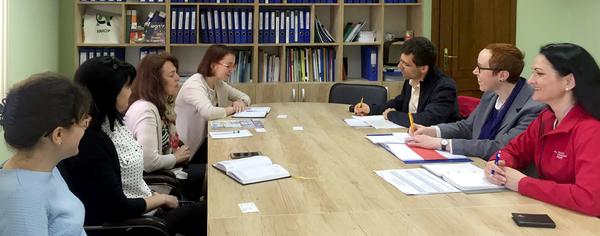
Everyday work at the Agency.
The external evaluation of quality in the higher education is performed by the National Agency for Quality Assurance in Professional Education. At the same time the current legislation enables HEIs to apply for external evaluation to any quality assurance agency abroad, provided that it is listed in the European Quality Assurance Register for Higher Education (EQAR).
External quality evaluation in higher education includes a multicriteria examination of the extent in which the institution providing training and its programs meets the national standards of reference. In order to gain this the quality evaluation in higher education encompasses the following aspects:
a) the institutional capacity;
b) the educational efficiency including academic outputs;
c) the quality of initial and continuous professional training programs;
d) the institutional management of quality;
e) the results of scientific research and/or artistic creation;
f) the compliance between the internal assessment and real situation.
According to the current legislation, any legal entity interested in delivering higher education programs, is subject to the external evaluation for provisional authorization before starting to function. The provisional authorization for higher education programs expires after the first cohort of graduates.
Every program leading to a distinct university qualification should be accredited. The higher education institutions will obtain the provisional authorization or accreditation for the Master’s degree and doctoral programs (Cycles II and III), provided that the Licentiate programs (Cycle I) in the same area are accredited.
The process of the external evaluation for provisional authorization or accreditation should be launched and carried out according to the methodologies,8 developed by the National Agency for Quality Assurance in Professional Education and approved by the Government.
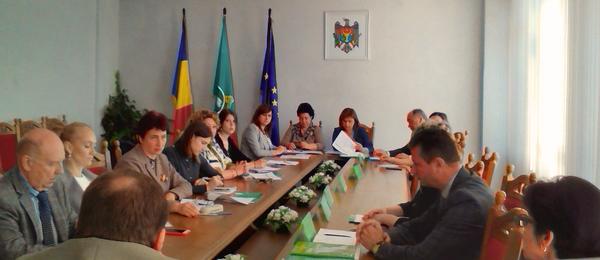
ANACIPʼs experts are visiting a higher education institution.
After undergoing the accreditation, the study programs and the higher education institutions is subject to periodical external evaluation for reaccreditation, at least once in five years.
The possible solution in the case of external evaluation for provisional authorisation are the following:
• the decision on the authorisation for provisional functioning,
• non-authorisation for provisional functioning.
Upon the external evaluation in the framework of accreditation one of the following decisions is possible:
• accreditation for the period of five years,
• provisional accreditation for the period of three years,
• suspension of external evaluation process for one year,
• non-accreditation.
The decisions by the results of external quality evaluation is the responsibility of the Government. Such decisions are made by the Government and on the proposal of the Ministry of Education, Culture and Research based on the results of evaluation carried out by the National Agency for Quality Assurance in Professional Education.
In case of negative results of external evaluation, the Ministry of Education, Culture and Research may suggest the Government to withdraw the license of the institutions or study programs, and the students have to be distributed to similar programs in other educational institutions until all the reasons caused the negative results are eliminated.
National Agency for Quality Assurance in Professional Education (ANACIP): main features
Legal status
The legal status of the National Agency for Quality Assurance in Professional Education (ANACIP) is governed by the Regulation on the organization and operation of the National Agency for Quality Assurance in Professional Education approved by the government.9
In accordance with the Regulation, ANACIP is an administrative authority, a legal entity, autonomous from the Government, independent in decision making and organization, financed from the state budget and own revenues.
Mission
The Agency’s mission is to develop and promote the quality culture in vocational education, higher and continuing education contributing to greater economic competitiveness and social cohesion in the Republic of Moldova.
Aim
The aim of the Agency is to ensure an integrated, reliable, objective and transparent system of external evaluation and accreditation of institutions and study programs in vocational education, higher and continuing education in the Republic of Moldova.
Strategic objectives
The Agency has the following strategic objectives:10
• to contribute to the development and promotion of the quality culture in vocational education, higher and continuing education;
• to evaluate study programs and the capacity of organizations providing vocational education, higher and continuing education in order to achieve the quality standards;
• to ensure the application of the Standards and Guidelines for Quality Assurance in the European Higher Education Area (ESG) in vocational education, higher and continuing education in the Republic of Moldova;
• to ensure access to public information about the quality of vocational education, higher and continuing education in the Republic of Moldova;
• to propose strategies and policies to partners in order to ensure and develop quality in vocational education, higher and continuing education;
• to promote professionalism and competitiveness of vocational education, higher and continuing education in the Republic of Moldova;
• to obtain international recognition of the Agency.
Duties and responsibilities
In accordance with the current Regulation (Article 8) the Agency fulfils a number of duties and responsibilities including the following:
• performs state policies on quality assurance in vocational education, higher and continuing education;
• develops and periodically reviews accreditation standards, national basic standards and efficiency indicators used when evaluating and assuring quality in professional, higher and continuing education in accordance with good European and international practices;
• performs, on a contractual basis, the quality evaluation of institutions delivering professional training programs and rendering educational services, as well as their programs authorize for provisional authorization, accreditation, and re-accreditation in vocational education, higher and continuing education;
• ensures objectivity and validity of the results obtained in the process of external evaluation of institutions providing educational services and their programs;
• ensures transparency in the external evaluation process including the publication of evaluation results;
• prepares and publishes papers on evaluation and accreditation of educational institutions, institutions rendering educational services and their programs;
• cooperates with similar agencies in other countries in order to develop and implement effective measures for improving the quality of professional training programs.11
Key results of the external evaluation of quality in higher education
Within a short period of its operation the Agency has implemented a number of missions of external evaluation of programs in higher education.
Thus, in September 2015, in the framework of the doctorate degree initiation in the format of the third cycle of higher education, upon the request from the Ministry of Education, Culture and Research the Agency performed external evaluation of quality for provisional authorization of 46 doctorate schools and their study programs. In autumn 2016 one hundred and eight programs of higher education in the field of pedagogy, four programs in tourism and five programs in catering and engineering underwent external evaluation for accreditation. The decisions of the Governing Board on these programs were submitted to the Ministry of Education, Culture and Research. Seven programs of higher education underwent external evaluation for provisional authorization.
In the first half of 2017 the total of 62 programs in economics were prepared for and underwent external evaluation. The results of the evaluation are subjects for discussion at the meeting of the Governing Board planned for September.
International cooperation
In December 2015 the National Agency for Quality Assurance in Professional Education was granted the associate membership status of the European Association for Quality Assurance in Higher Education (ENQA).
Over the period from 2015 to 2017 the Agency endorsed agreements on cooperation with different interested institutions on both the national and international levels. The active partners of ANACIP are the National Institute of Standardization (March 9, 2016), the German Agency for Quality Assurance (AQAS, March 9, 2016), the National Accreditation Agency of the Russian Federation (NAA, September 27, 2016), the Estonian Higher Education Quality Agency (EKKA, November 16, 2016), the Romanian Agency for Quality Assurance in Higher Education (ARACIS, April 17, 2017). The agency is currently negotiating cooperation with the European Quality Assurance Register for Higher Education (EQAR) of Kazakhstan.
Future prospects
It is evident that the reforms in the sphere of higher education represent a long-term and ongoing process. Structural changes and particularly quantitative reforms should be supplemented with the quality contents. This requires ongoing cooperative and well-coordinated actions. For this purpose the Agency is planning a number of actions, namely:
- create and disseminate quality culture in all higher education institutions and within the society in general;
- improve/amend the regulatory framework in order to improve the quality of the organized processes;
- organize and carry out external evaluation in strict compliance with the legislative and regulatory framework;
- consolidate the ANACIP’s Expert Register; capacity building of ANACIP’s external experts by their involvement and participation in external reviews carried out by international quality assurance agencies;
- identify financial resources in order to attract/involve international experts into organized missions of external evaluation of quality of higher education institutions in Moldova and/or their programs;
- hold training seminars and workshops for the university management responsible for the quality assurance, national and external experts of ANACIP on a regular basis;
- promote European values and good practices in the sphere of higher education and particularly quality assurance in higher education on the national level;
- constantly develop and raise awareness and enhancement of public relations;
- ensure maximum transparency and correctness of the processes of external quality evaluation;
- extend the ANACIP’s international cooperation;
- enhance an international aspect of the ANACIP’s activity by membership in the specialized organizations of the regional, European and international levels and participation in their events.
Contacts:
National Agency for Quality Assurance in Professional Education (ANACIP)
38A. Hîncești Street, Chișinău, MD-2028, Republic of Moldova
Tel.: +373 22545411, E-mail: anacip@anacip.md
References
1. Higher education in the 2016/17 academic year. [Online]. Free access: http://bit.ly/HED2Md01
2. Doctoral studies in 2016. [Online]. Free access: http://bit.ly/HED2Md02
3. Education in Moldova 2008/2009. [PDF]. Free access: http://bit.ly/HED2Md03
4. Education in Moldova 2015/2016. [PDF]. Free access: http://bit.ly/HED2Md04
5. Code of Education No.152, 2014, Article 112. [Online]. Free access: http://bit.ly/HED2Md5
6. Cadrul Național al Calificărilor. [Online]. Free access: http://bit.ly/HED2Md6
7. Methodology of external quality evaluation for provisional authorization and accreditation of vocational education and training, higher education and lifelong learning study programs in the Republic of Moldova, Government Decree No.616 of May 18, 2016. [Online]. Free access: http://bit.ly/HED2Md7
8. Moldova 2020. National Development Strategy. [PDF]. Free access: http://bit.ly/HED2Md8
9. The list of majors for professional training at higher education institutions, Cycle I, Law No.142 of July 7, 2005. [Online]. Free access: http://bit.ly/HED2Md9
10. The list of majors for professional training in higher education, Government Decree No.482 of June 28, 2017. [Online]. Free access: http://bit.ly/HED2Md10
11. Regulation on the organization and operation of the National Agency for Quality Assurance in Professional Education, Government Decree No.191 of April 22, 2015. [Online]. Free access: http://bit.ly/HED2Md11
12. Standards and Guidelines for Quality Assurance in the European Higher Education Area – ESG, 2015, Brussels, Belgium. [PDF]. Free access: http://bit.ly/HED2Md12
13. Strategy “Education 2020,” Government Decree No.944 of November 14, 2014. [Online]. Free access: http://bit.ly/HED2Md13
14. Development strategy of vocational education for 2013-2020, www.edu.gov.md
15. www.anacip.md
16. www.edu.gov.md
17. www.ehea.info
2 Cadrul Național al Calificărilor. http://bit.ly/HED2Md6
3 The list of majors for professional training at higher education institutions, Cycle I, Law No.142 of July 7, 2005; The list of majors for professional training in higher education, Government Decree No.482 of June 28, 2017. http://bit.ly/HED2Md10
4 Statistical data are synthesized from the National Statistics Bureau. The activity of higher education institutions in the 2016/2017 academic year; Education in Moldova 2008/2009, 2015/2016. www.statistica.md
5 Statistical data from the National Statistics Bureau. Doctoral studies in 2016. [Online]. Free access: http://bit.ly/HED2Md02
6 Code of Education No.152, 2014, Article 112. [Online]. Free access: http://bit.ly/HED2Md5
7 Methodology of external quality evaluation for provisional authorization and accreditation of vocational education and training, higher education and lifelong learning study programs in the Republic of Moldova, Government Decree No.616 of May 18, 2016. [Online]. Free access: http://bit.ly/HED2Md7
8 Regulation on the organization and operation of the National Agency for Quality Assurance in Professional Education, Government Decree No.191 of April 22, 2015. [Online]. Free access: http://bit.ly/HED2Md11
9 Ibid.
10 Ibid.